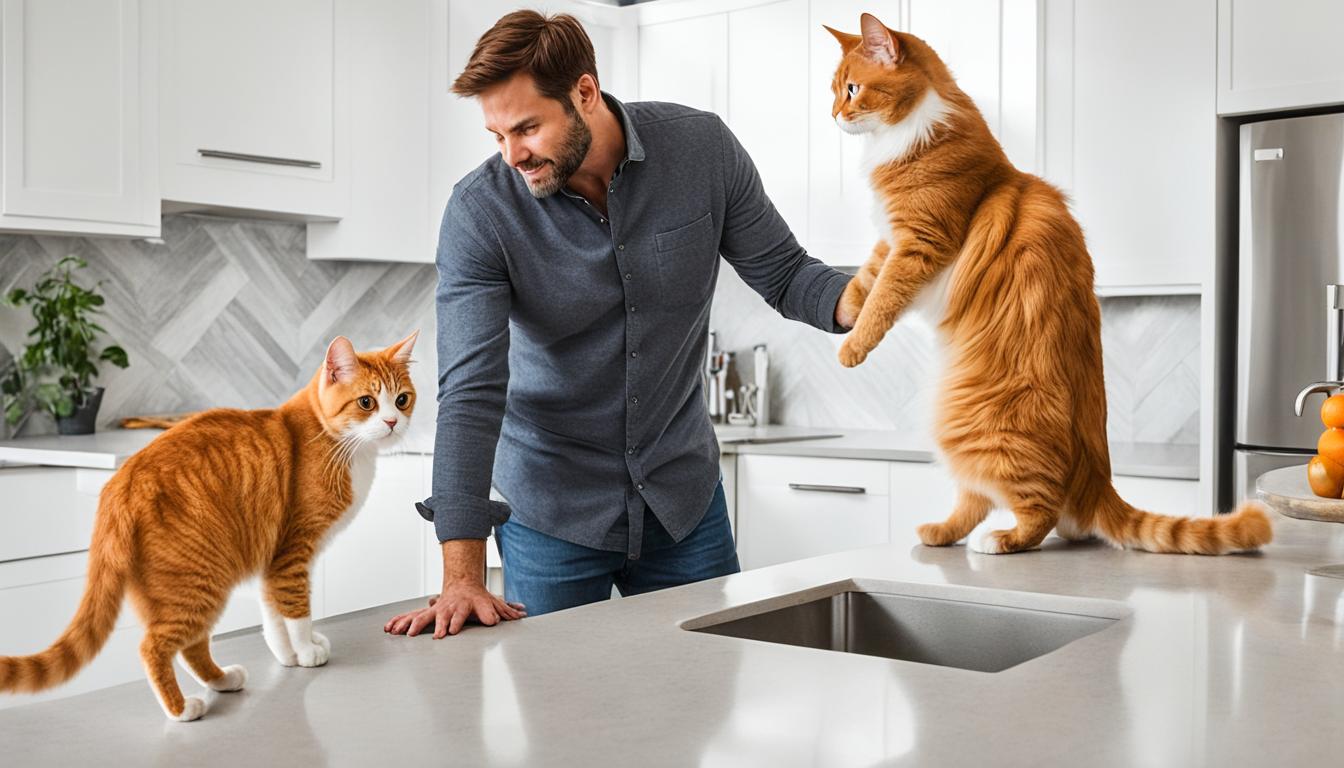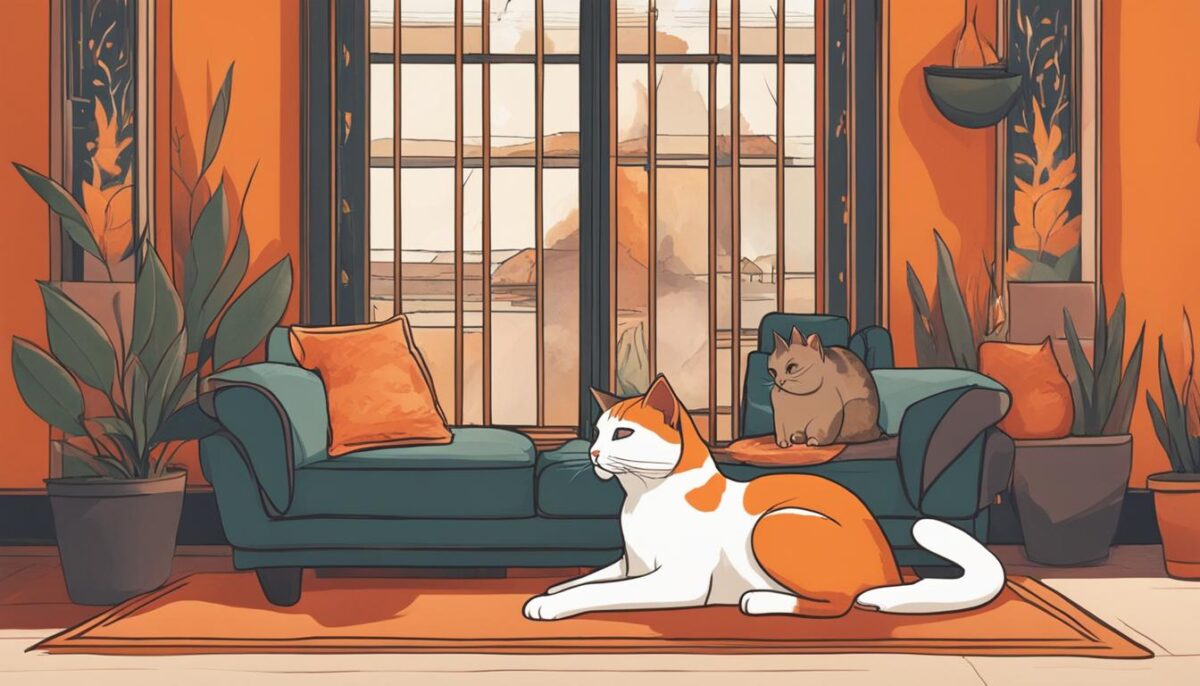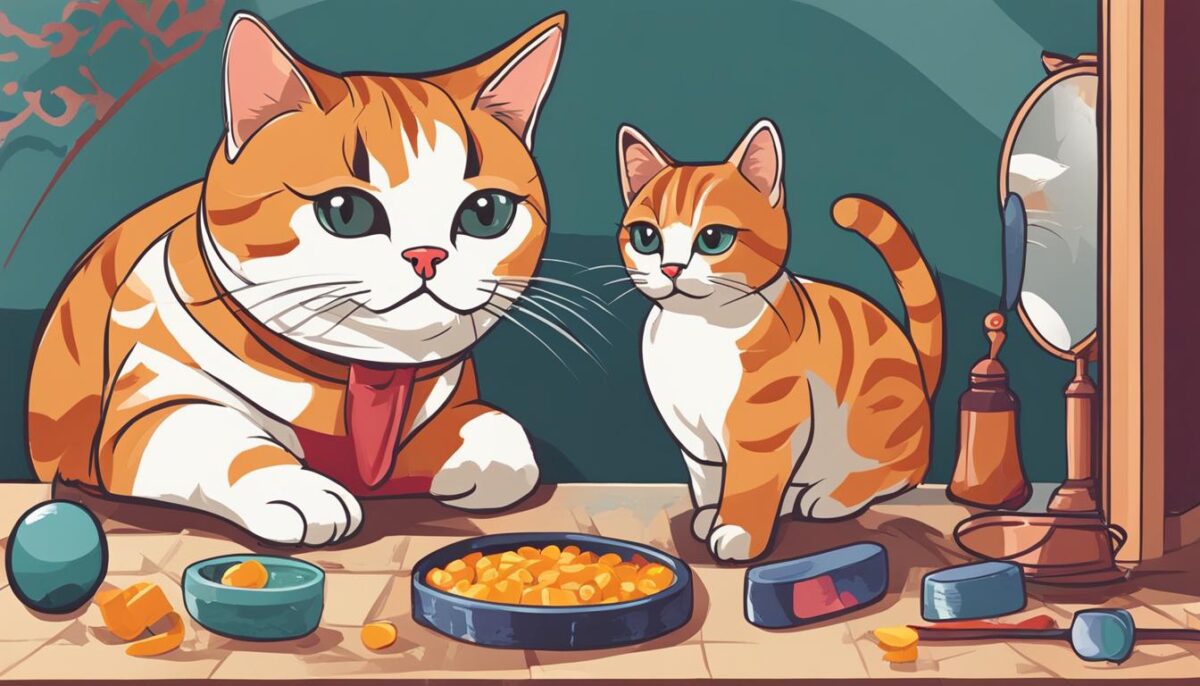Do you think your furry friend gets jealous? Well, you might be right. Just like us, cats can catch a case of the green-eyed monster. Understanding cat behavior helps you see if cats feeling jealous. They love attention and might not want to share you with anyone else.
When you pet a cat, watch how they act. They may snuggle up to you more or be where you are all the time. This could be a way of showing they want all your love. If another pet comes near, your cat might hiss or swat. These are clues that your cat might be feeling jealous.
Jealousy in cats is like when you want your favorite toy all to yourself. Cats feel the same about their favorite person – that’s you! Feline emotions can be big and strong. So, remember to give tender care to your cat to keep them purring happily.
Key Takeaways
- Cats might feel jealous like people do.
- Jealousy shows that your cat loves being with you.
- Watch for signs like sticking close and hissing at others.
- Understanding cat behavior means noticing their feelings.
- Keep giving love to your cat, especially if you’re busy or have new pets.
Understanding Jealousy in Animals
Jealousy isn’t just something humans feel; animals experience it too. Believe it or not, many animals have emotional behaviors that can seem a lot like the feelings we have. They form close bonds and work hard to keep their buddies close. Can you imagine how a puppy might feel when another dog comes along and wants to play with their favorite person? They might feel jealousy, one of the many complex animal emotions.
You know how you might feel sad when your friend goes away or very happy when you get a surprise gift? Animals might have similar feelings. They often use smart ways to get things done, like using tools or solving tricky problems. They can even show off their own special personalities! While we need to do more studying to be totally sure, it seems like animals, including our cat friends, might feel jealous at times, just like you and me.
It’s amazing how animals can show us what they’re feeling without talking. When you see your cat getting extra cuddly when you’re paying attention to another pet, that could be their way of saying, “Hey, don’t forget about me!” This could be a sign that they’re feeling a little bit jealous. Over time, as people have watched animals live their lives, they’ve noticed these kinds of jealousy evolution happening in the animal world.
| Animal | Tool Use | Emotional Signs | Playful Behaviors |
|---|---|---|---|
| Cats | Sometimes | Cuddles more when you’re with other pets | Loves chasing laser pointers |
| Dogs | Can be trained | May whine or guard their toys | Enjoys playing fetch |
| Birds | Uses twigs to build nests | Chirps loudly when you pay attention to others | Likes to mimic sounds or dance |
Isn’t it wonderful thinking about all the ways animals are a lot like us? Next time you watch your pets or visit the zoo, see if you can spot any of these emotional behaviors in animals. Remember, just like every person is unique, each animal is special in their own way too!
The Behavior Behind Feline Jealousy
Have you noticed your furry friend acting a bit strange when you spend time with others? Cats are more like us than you might think! They can show signs of cat jealousy and want your attention all to themselves. Let’s explore how these cute creatures show their feelings.
Signs of Possessiveness in Cats
If your cat always wants to be the center of your world, it might be a case of cat possessiveness. Do they follow you everywhere or plop down on your laptop when you’re working? They’re not just being cute; they might be saying, “Hey, look at me!”
Aggressive Responses and Jealousy
Sometimes, jealousy can lead to a bit of a kitty tantrum. Cat aggression and feline jealousy aggression are real things. Watch out for hisses, swats, or even a surprise nip at your other pet. That could be their way of showing they’re not too pleased with sharing the love.
Subtle Behaviors Indicating Jealousy
Jealous cat behaviors aren’t always loud and scary. Sometimes they’re quiet, like a secret whisper. Your cat may start subtle jealous behaviors, like knocking things off the table or grooming non-stop. These little actions might be signs they feel emotional stress in cats.
Understanding our pets can make a big difference in how we care for them. If you think your cat is feeling anxious, look out for these cat anxiety signs. It’ll help you figure out the best way to make them feel secure and loved. Just remember, every cat is unique, so it’s all about learning what makes your buddy tick!
| Behavior | What It Might Mean |
|---|---|
| Cuddling excessively | Wanting more attention |
| Hissing at new pets | Feeling threatened or jealous |
| Knocking items over | Acting out or feeling neglected |
| Excessive self-grooming | Feeling stressed or anxious |
Keep an eye out for these hints, and you’ll be a great friend to your kitty. They might not be able to talk, but their actions speak loud and clear. Love, patience, and a little bit of detective work will go a long way in soothing a jealous cat’s emotions.
What Triggers Jealousy in Your Feline Friend?
Have you ever noticed your furry friend getting a bit upset when things change around the house? Just like us, cats can feel jealous when their daily fun gets shifted around. Let’s explore what might be stirring up those feelings in their whiskered heads.
Causes of cat jealousy can come from simple changes. Maybe you’ve been playing less with your kitty or someone else in the house is getting some extra treats. Cats notice these things and might not be too happy about it.
Imagine bringing home a new pet or having more friends over. To your cat, these are big changes! Their perfect world, where they are the star, has new characters. It can be tough for them to share attention.
What about when everyone’s busy and the house is full of hustle and bustle? Yep, this too can be a cause for a reaction. Your cat might be used to calm and quiet and might not understand the sudden rush. This can make them feel left out or forgotten.
A cat’s reaction to change isn’t always loud. Sometimes they tell you with small signs. They might not sit in your lap as much or they might hide away. Paying attention to how they act can tell you a lot about how they’re feeling.
- Less cuddle time
- Someone else getting treats
- New pets or people
- A busy household
Knowing what upsets your kitty and cat behavior triggers can help you make them happy again. Keeping things they love the same, like their favorite nap time or play time, can make a big difference. And when things have to change, show them some extra love. They’ll appreciate it!
Always keep an eye out for those little changes and help your cat feel secure and loved, no matter who or what comes into their world. It’s the best way to keep that purr going strong.
Health Concerns Linked to Jealous Behaviors
When your feline friend can’t move as fast or as easy as they used to, it may not just affect their cat health and behavior. Sometimes, if they see other pets being petted or playing in high spots they can’t reach, they might feel sad or left out. This could look like jealousy. Taking care of a cat’s health is more than just helping them get over sickness. It’s also about making sure they are happy and don’t feel bad when they can’t join in.
Limited Mobility and Emotional Reactions
If your cat isn’t able to jump or climb because of getting older or an injury, they may feel a little jealous. This is especially true if they see other pets getting love in places they can’t go to anymore. It’s important to watch for these sad feelings and help your cat feel included again. This can help with their emotional impact of disabilities.
Addressing Health Issues to Alleviate Jealousy
One way to help your cat is to find nice ways for them to be part of activities even if they’re not 100%. You might make a cozy spot for them on the couch or the bed where everyone hangs out. That way, they won’t miss out on cuddles and fun, and this can help in reducing jealousy in cats. When your cat feels like they are part of the family, they will likely be happier and less jealous.
Ways to Manage and Prevent Your Cat’s Jealousy
When your cat’s tail gets fluffy, and they look a little grouchy, they might be feeling jealous. Cats have big hearts and sometimes they need extra love to feel happy. Let’s talk about some simple ways you can make sure your cat feels as special as they are, and prevent that green-eyed monster of jealousy from creeping in!
Ensuring Equal Attention and Affection
Think about when you’re with your friends. You want to make sure everyone gets a turn to play, right? Well, cats want the same thing! Sharing your time equally can stop your cat from feeling left out. Just sitting together, gentle pets, and telling them they are a good kitty can go a long way. And don’t forget those treats and toys; they tell your cat, “Hey, I haven’t forgotten about you!”
Introducing New Pets or Family Members
New friends are exciting, but for your cat, it can be a big change. When a new pet or person comes home, remember that slow and easy does it. Let your cat watch and sniff around first. A happy treat party for your cat can turn a scary new friend into a fun one!
Behavioral Enrichment to Reduce Anxiety
Just like how you love new toys and games, your cat loves new things to do. It’s cool to watch them have fun, like cat enrichment activities, which are just another name for “awesome cat games.” A puzzle feeder or a new climbing tree can make your cat’s day bright!
These tips are like a treasure map to help your cat feel adored and calm. Adapting cats to changes and managing cat emotions isn’t always easy, but with patience and a whole lot of love, you can prevent feline jealousy. Now, let’s see what fun things you and your cat can do together!
Conclusion
Understanding your cat’s feelings is really important. Just like us, cats can have big feelings too. Sometimes, they might feel jealous. It’s a bit like when you really want to play with your friend, but they are playing with someone else. This makes you feel a bit left out. Cats can feel this way too!
It’s tricky to know for sure if cats get jealous because we can’t ask them. But you can learn a lot by watching what they do. If your cat is trying hard to get your attention or doesn’t want to share you with other pets, they might be feeling jealous. Learning about these signs can help you make sure your cat is happy and feeling loved.
If you ever think your cat is feeling jealous, it’s okay. You can help them feel better! Give them lots of love, play with them, and be their friend. You can solve the puzzle of feline jealousy together. Keep an eye on your furry friend, and make sure they know they’re a special part of your family.
FAQ
Do cats experience jealousy the way humans do?
Many people believe cats can experience a form of jealousy. This emotion helps them protect their relationships and maintain closeness with their preferred humans or fellow pets. Although it’s difficult to say if they feel jealousy the same way humans do, their behaviors, like seeking extra attention, can be indicative of jealous feelings.
How can I tell if my cat is feeling jealous?
You might notice signs of jealousy in your cat through possessive behaviors, such as insisting on being near you at all times or interfering with your activities to gain attention. Other manifestations include aggression toward people or other animals, seemingly unprovoked knocking over of objects, excessive grooming, or hiding—these can all be behavior clues that your cat is experiencing jealousy.
What triggers jealousy in cats?
Changes in their environment or routine can trigger feelings of jealousy in cats. This includes introducing new pets or family members, rearranging the home, changes in playtime or attention, or even distributing treats unequally. Cats enjoy consistency and might react with jealousy to any deviations from their norm.
Can health issues cause a cat to display jealousy?
Yes, cats who have limited mobility from an injury or age-related issues may feel left out and display behaviors that can be interpreted as jealousy. This emotional stress can occur if they can’t access areas where they previously received attention or if they witness other pets receiving care in inaccessible places.
How can I prevent my cat from feeling jealous?
To prevent jealousy in your cat, give consistent affection, treats, and playtime. When significant changes like a new pet or baby are introduced into the household, do so gradually and ensure positive experiences for your cat during this time. Address any health concerns timely to prevent emotional repercussions.
What is the best way to manage jealousy when introducing a new pet?
Introduce new pets slowly and in controlled, positive settings, often involving treats and play to make the experience more enjoyable for your cat. Monitor your cat’s behaviors and provide reassurance through attention and affection to help manage potential jealousy.
How can I help my aging or injured cat feel less left out?
You can help your aging or injured cat by making sure they can still participate in family activities and socializing events. Make adjustments to your home if necessary to accommodate their mobility needs, and continue to give them attention and love to alleviate feelings of jealousy or exclusion.
Are there other emotional behaviors in animals that resemble jealousy?
Yes, animals demonstrate a range of emotional behaviors that can be similar to human emotions, such as possessiveness, anxiety, and even grief. These behaviors are part of the complex emotional lives of animals, including cats, indicating that they too can experience feelings akin to jealousy.
What enrichment activities can reduce anxiety and jealousy in cats?
Providing behavioral enrichment activities can help reduce anxiety and jealousy in cats. This includes interactive toys, puzzle feeders, access to safe outdoor enclosures or windows with views, and dedicated playtime with you. These activities stimulate their mind and body, helping to alleviate any jealousy they might be feeling.
Could my cat’s aggressive behavior towards a new kitten be due to jealousy?
It is possible. If your cat displays aggression towards a new kitten, it may stem from feelings of jealousy or threatened territory. It’s important to supervise interactions and gradually encourage positive association through joint play sessions and shared rewards.


